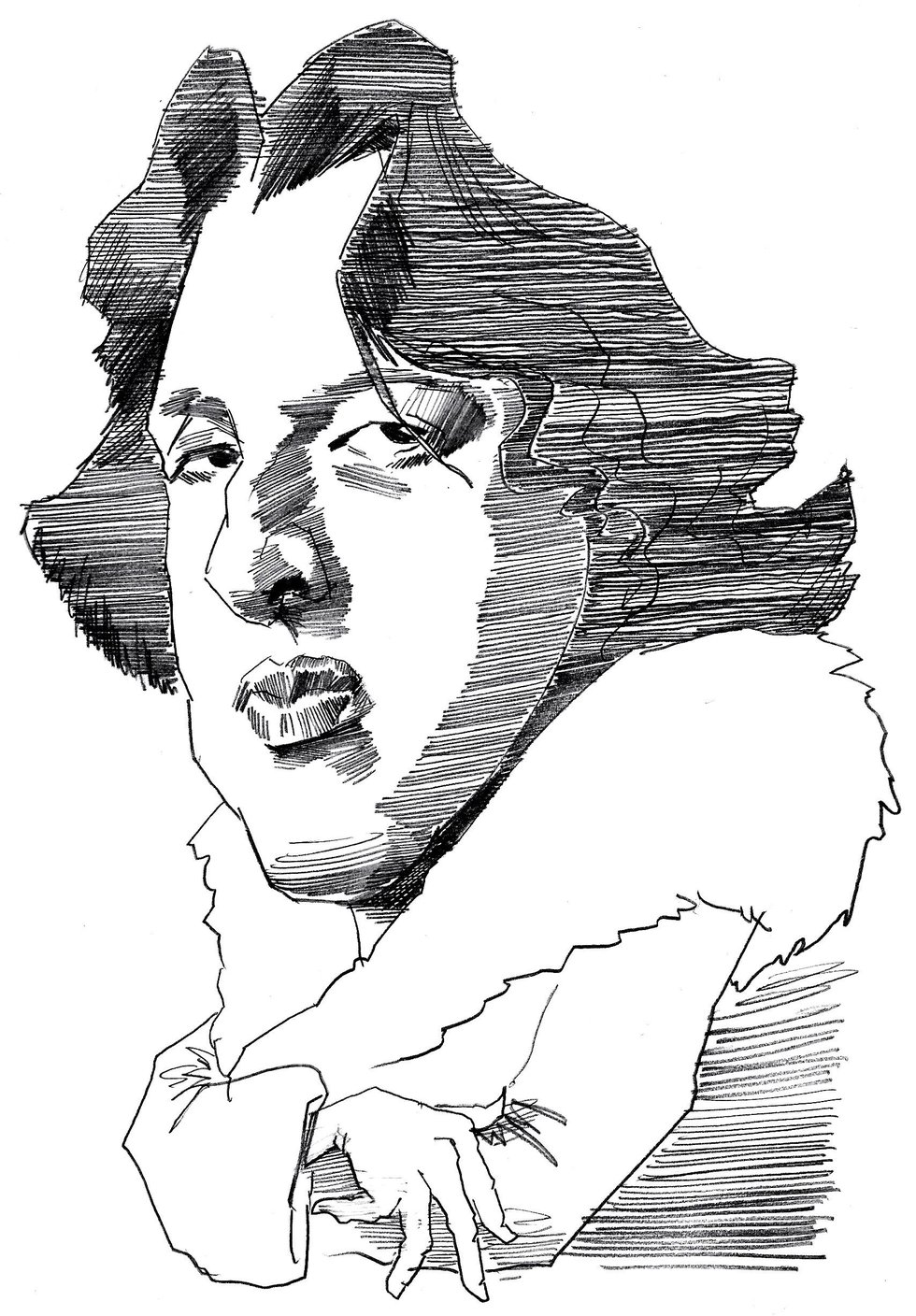
Oscar Wilde
Oscar Wilde. Illustration by Chris 'Honeysuckle' Ellis.
“I have nothing to declare — except my genius.” With those modest words to the customs agent in New York City (or so the story goes), Oscar Wilde embarked on a lecture tour of America, a cross-country journey that would bring him to Memphis on June 12, 1882.
The 27-year-old British poet had yet to gain international fame as the author of The Picture of Dorian Gray, The Importance of Being Earnest, and other literary accomplishments. At this early stage in his star-crossed career, though, Wilde had established — even created — himself as “The Apostle of Aestheticism,” perhaps the leading voice of a burgeoning movement that encouraged the appreciation of all things beautiful. A great deal of his glitter came from his unique ability to turn a phrase; offhand compliments like “One can always be kind to people one cares nothing about” and “Vulgarity is simply the conduct of other people” made him the talk of London.
To share his views — and pick up some handy cash — Wilde hired an agent to arrange lectures across the United States and Canada, visiting more than 150 cities in less than 11 months. His Memphis lecture, like most of the others, was titled “The Decorative Arts” and took place on a Monday evening at Luebrie’s Theatre downtown on Jefferson. Admission was one dollar, a hefty sum in those days, but newspapers reported that “there is a great curiosity to see and hear Oscar Wilde.”
That evening, the theater was “well-filled from the ranks of the culture and refinement of Memphis,” and the audience was treated to a rather unusual spectacle when Wilde took the stage. “His costume was extremely extreme,” said the Memphis Daily Avalanche. “A black velvet coat and knee breeches, black silk hose, low shoes with buckles, billowy shirt front, combining neck drapery equally as fussy.”
With a large flower in his lapel and his flowing dark hair reaching past his collar, Wilde probably looked quite the dandy as he began to speak.
“Everything made by the hand of man is either ugly or beautiful, and it might as well be beautiful as ugly …”
Among other pronouncements, Wilde complained that Americans sat on horsehair sofas, a seemingly innocuous remark that earned him a rebuke in the newspaper the next day: “This slander upon our institutions certainly would place the great apostle beyond the pale of forgiveness.”
Another reviewer observed that Wilde spoke “in a voice painfully monotonous and with a slight tendency to whine” and griped about “this young sprig of aristocracy telling how good it is, and how pretty prettiness is.”
After the lecture, Wilde was the guest of honor at a private reception at the home of J. Harvey Mathes, a rambling house at the corner of Cynthia and Pontotoc. If Memphians enjoyed his visit, it was hard to tell from the newspapers. The next day, an editorial in the Memphis Appeal observed, “Oscar Wilde, the much-lauded aesthete, has come and gone, and so far as we can perceive, has not left the people of Memphis any wiser, but the poorer by some dollars by his coming.” That didn’t matter to Wilde, who had already left Memphis for Vicksburg.
A few days after his visit to Memphis, he would write to a friend, “I write to you from the beautiful, passionate, ruined South, the land of magnolias and music, of roses and romance.” Somewhat later, he expressed a rather different opinion of this region: “It is absurd to say that there are neither ruins nor curiosities in America when they have their mothers and their manners.”
Wilde, of course, would return to England and go on to considerable fame and fortune. He would marry, have two children, and see himself acclaimed one of the leading playwrights of his day. Then came his downfall — the result of a long and impassioned affair with a young man, Lord Alfred Douglas. In 1895, he was tried and convicted on trumped-up charges of “committing indecent acts.” The sentence: two years at hard labor.
The brutal prison experience destroyed him. After his release, his spirit and health broken, shunned by his family and friends, Wilde spent the rest of his life in France, a virtual recluse. He died of cerebral meningitis on November 30, 1900, the result of an injury to his ear while he was in prison. He was just 46 years old.
The Memphis Appeal reported that “he died attended by a few faithful friends, who declined to accept the general verdict of the world against him.”
Today, the old Mathes home at 299 Cynthia still stands, much the worse for wear, a decaying reminder of the days when Memphis honored the Apostle of Aestheticism.
This article originally appeared in the May 1996 issue of Memphis magazine. The Mathes home was demolished a few years later. It's not a "decaying reminder" of anything; the site is now a vacant lot. And the theater on Jefferson where Oscar appeared? That location is now a Subway.
